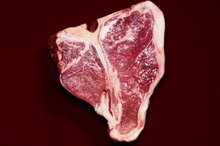Advantages & Disadvantages of the Alkaline Diet
The alkaline diet is an alternative diet that attempts to correct the body’s pH by emphasizing foods that have alkalizing reactions in the body. Although few medical studies have linked the alkaline diet to specific health benefits, proponents claim that the diet treats a variety of conditions from digestive problems to cancer. For best results, talk to your dietician before undergoing a drastic change in your eating habits.
Definition
Proponents of the alkaline diet claim that certain foods lead the body to become overly acidic 1. Despite its claims, the alkaline diet has produced few studies in support of its methodology. The body has multiple mechanisms for correcting your pH to the ideal levels of 7.35 to 7.45, registered dietitian Stephanie Vangsness of The Brigham and Women’s Hospital explains.
Advantages
Acid Forming Foods Vs. Alkaline Forming Foods
Learn More
According to the Wolfe Clinic website, which promotes the diet, when the body is acidic it resorts to leaching minerals such as:
- calcium
- sodium
- magnesium
- potassium from vital organs
In this state, your saliva, muscles, bones and teeth may deteriorate, causing a variety of negative symptoms, such as
- muscle cramps
- twitches
- electrolyte deficiency
- brittle bones
Supporters of the alkaline diet purport that reducing your intake of acidifying foods and increasing your intake of alkalizing foods can help reverse symptoms caused by acidity. Despite the lack of mainstream medical evidence, the alkaline diet may provide many nutritional benefits by supporting the consumption of foods that are generally considered healthy, such as
- fish
- eggs
Disadvantages
Vangsness advises against the alkaline diet because it promotes the exclusion of some healthy foods. Certain fats and oils that are restricted from the alkaline diet can provide essential fatty acids, which are required to maintain immunity and make healthy cells. Beans and legumes are also discouraged, limiting your intake of helpful phytonutrients that may boost the immune system and lower your risk of cancer.
Safety Concerns
List of Non-Acidic Fruits & Vegetables
Learn More
Talk to your doctor before adopting an alkaline diet to reduce the risk of malnutrition and other negative effects. Because of the lack of scientific evidence, the alkaline diet may not be appropriate or safe for all people, and it is generally suggested that you make necessary concessions as your body requires.
Related Articles
References
- Eczema Natural Healing; Eczema Food Allergies -- Removing Offending Foods; 2005
- The Telegraph, "Cleanse your body with the alkaline diet." Dec. 29, 2014
- Han H, Segal AM, Seifter JL, Dwyer JT. Nutritional Management of Kidney Stones (Nephrolithiasis). Clin Nutr Res. 2015;4(3):137-52. DOI: 10.7762/cnr.2015.4.3.137
- Schwalfenberg GK. The alkaline diet: is there evidence that an alkaline pH diet benefits health?. J Environ Public Health. 2012;2012:727630. DOI:10.1155/2012/727630
- Remer, T et al. Potential Renal Acid Load of Foods and its Influence on Urine pH, Journal of the American Dietetic Association, Volume 95, Issue 7, 791 - 797 DOI:10.1016/S0002-8223(95)00219-7
- Dawson-Hughes B, Harris SS, Ceglia L. Alkaline diets favor lean tissue mass in older adults. Am J Clin Nutr. 2008;87(3):662-5. doi: 10.1093/ajcn/87.3.662
- Fagherazzi G, Vilier A, Bonnet F, et al. Dietary acid load and risk of type 2 diabetes: the E3N-EPIC cohort study. Diabetologia. 2014;57(2):313-20. doi:10.1007/s00125-013-3100-0
- Xu H, Åkesson A, Orsini N, Håkansson N, Wolk A, Carrero JJ. Modest U-Shaped Association between Dietary Acid Load and Risk of All-Cause and Cardiovascular Mortality in Adults. J Nutr. 2016;146(8):1580-5. doi:10.3945/jn.116.231019
- Han E, Kim G, Hong N, et al. Association between dietary acid load and the risk of cardiovascular disease: nationwide surveys (KNHANES 2008-2011). Cardiovasc Diabetol. 2016;15(1):122. doi:10.1186/s12933-016-0436-z
- Jia T, Byberg L, Lindholm B, et al. Dietary acid load, kidney function, osteoporosis, and risk of fractures in elderly men and women. Osteoporos Int. 2015;26(2):563-70. doi:10.1007/s00198-014-2888-x
- Rebholz CM, Coresh J, Grams ME, et al. Dietary Acid Load and Incident Chronic Kidney Disease: Results from the ARIC Study. Am J Nephrol. 2015;42(6):427-35. doi:10.1159/000443746
Writer Bio
Based in the Appalachian Mountains, Brian Connolly is a certified nutritionist and has been writing professionally since 2000. He is a licensed yoga and martial arts instructor whose work regularly appears in “Metabolism,” “Verve” and publications throughout the East Coast. Connolly holds advanced degrees from the University of North Carolina, Asheville and the University of Virginia.









